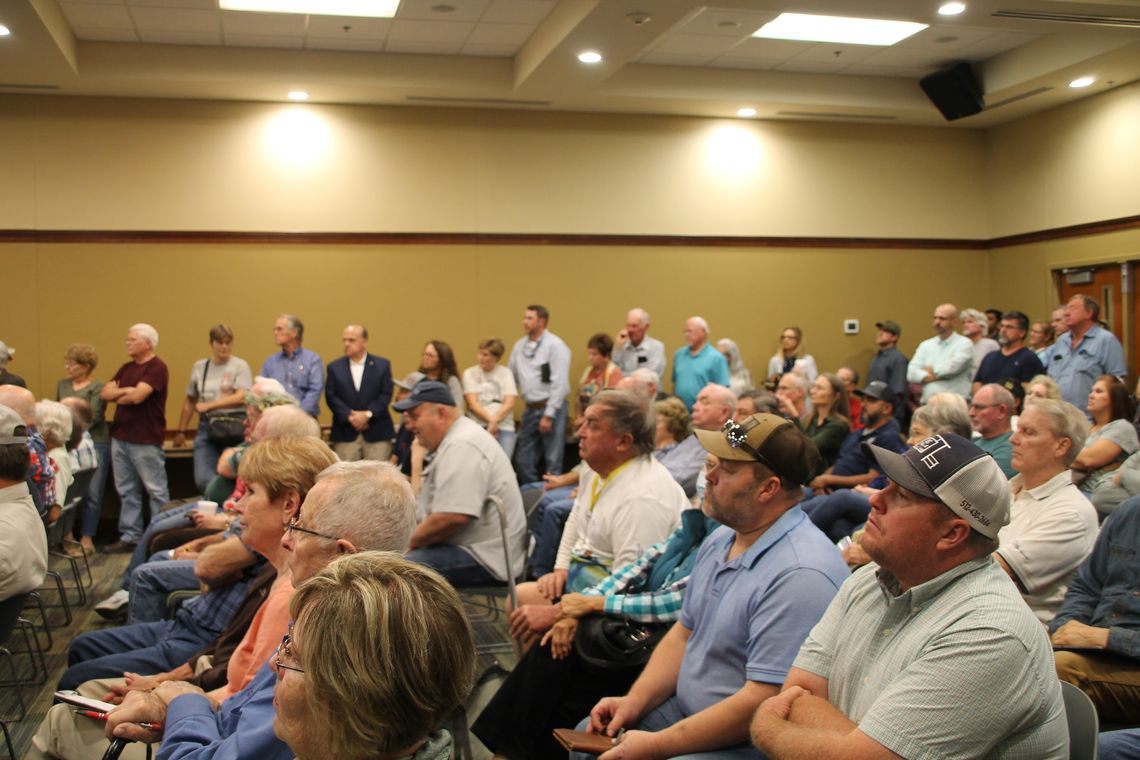Pushback seems to be taking the steam out of a proposed state House bill giving Taylor additional power to squash municipal utility districts in the extraterritorial jurisdiction around the Samsung Austin Semiconductor facility.
“HB 4493 was brought to my office by city of Taylor officials, and I filed it in good faith after being told there was no opposition to the bill,” said the legislation’s sponsor, state Rep. Caroline Harris, R-Round Rock. “Since then, my office has heard opposition that we were previously unaware of. The legislative process is designed to invite this input, and I welcome additional information from constituents that highlights how the draft legislation could affect the community.”
The bill, for now, is not moving forward, she added.
City officials confirmed the narrowly targeted bill — which is still has a long way to go before being enacted, if ever — is designed to control housing developments around the chipmaking plant. Municipal officials prefer industrial and tech companies have access to the property, they said.
“Taylor is in a unique position, as reflected in the narrowly tailored language of HB 4493,” wrote Mayor Brandt Rydell in a March 23 letter to Harris. “Significant effort, energy, and expense went into attracting the ‘largest foreign direct investment in Texas on record’ to Taylor. It is imperative that we leverage all that effort, energy, and expense, (notably significant infrastructure improvements) for even greater economic development opportunities in advanced technology for Taylor, Williamson County, and the State of Texas. By preserving a one-mile buffer around the Samsung site as a Taylor Technology Corridor, the City of Taylor seeks to encourage complementary industrial and technology developments for the semiconductor and high-tech industry.”
In early March, Harris filed the bill, which would grant “a municipality of more than 16,260 and less than 16,660” the power to refuse consent for the development of a MUD, which is a taxing district typically used to finance infrastructure for residential subdivisions, if it is within one mile of a semiconductor manufacturing facility.
“The way that that bill was written, that applies only to the city of Taylor,” said attorney Chris Johns, who is heading up a mass-action lawsuit against the city for limitations on development in the ETJ outlined in the Envision Taylor Comprehensive Plan.
Landowners say the plan is unfairly devaluing their property.
“She (Harris) may as well have said that this bill only applies to cities that begin with ’T’ and rhyme with ‘Aylor.’ My take is that it is unconstitutional bracketing, which is where you pass a law that would only apply to one set of people and kind of unfairly targets them,” the attorney added.
Under current law, despite a city having some say over development in its ETJ, developers can bypass municipalities and go straight to the Texas Commission on Environmental Quality for approval to move forward with a new MUD.
City spokeswoman Stacey Osborne said HB 4493 is indeed is specific to Taylor’s needs.
“It was written for Taylor,” Osborne said. “We wanted this legislation so we could have more control over the land use in our city, specifically the area around Samsung, because that is an important area for economic development... The primary reason that MUDs are created is so that they can create (housing) developments, and in that 1-mile buffer around Samsung, we would prefer to have that land used for industrial uses, specifically for suppliers for Samsung, so they don’t go to another city or they don’t go to another place. “
But Johns said chances are slim the legislation will make it out of committee and onto the floor of the House for deliberations.
“I don’t think it has a chance of passing,” Johns said. “If anything, we know where that came from. To me, it shows the city’s bad faith. That’s my first thing. The second thing is, I think she (Harris) was carrying somebody’s water without understanding the impacts that this had on people or what the city of Taylor is doing to folks.”
Osborne said this type of legislation is legal and regularly used by municipalities.
“Now we are not restricting any land that is currently owned in that area,” Osborne said. “People can do what they are doing on that land in perpetuity if they want to, but we would like to keep things like residential developments from being built in that area because we want to preserve that area for economic development. We want to preserve that area for technology-related economic development.”
Furthermore, Rydell said the bill does not prevent landowners from selling their property.
“HB 4493 merely prohibits the … TCEQ from unilaterally creating MUDs without consent from the city of Taylor within the Taylor Technology Corridor,” Rydell wrote. “Developers would still be able to seek traditional legislative creation of MUDs under HB 4493.”
In the meantime, however, Harris said the bill is on hold until several issues can be ironed out.
“I will always stand firm for individual property rights and look forward to working with constituents and the city of Taylor to see if a legislative solution would be helpful to the community,” Harris said. “This legislation will not move forward unless differences are resolved.”
Nicole Lessin is a reporter for the Taylor Press with more than 20 years of experience in journalism.
To read more stories like this, subscribe to the Taylor Press. For more information, call 512-352-8535 or email news@taylorpress.net





